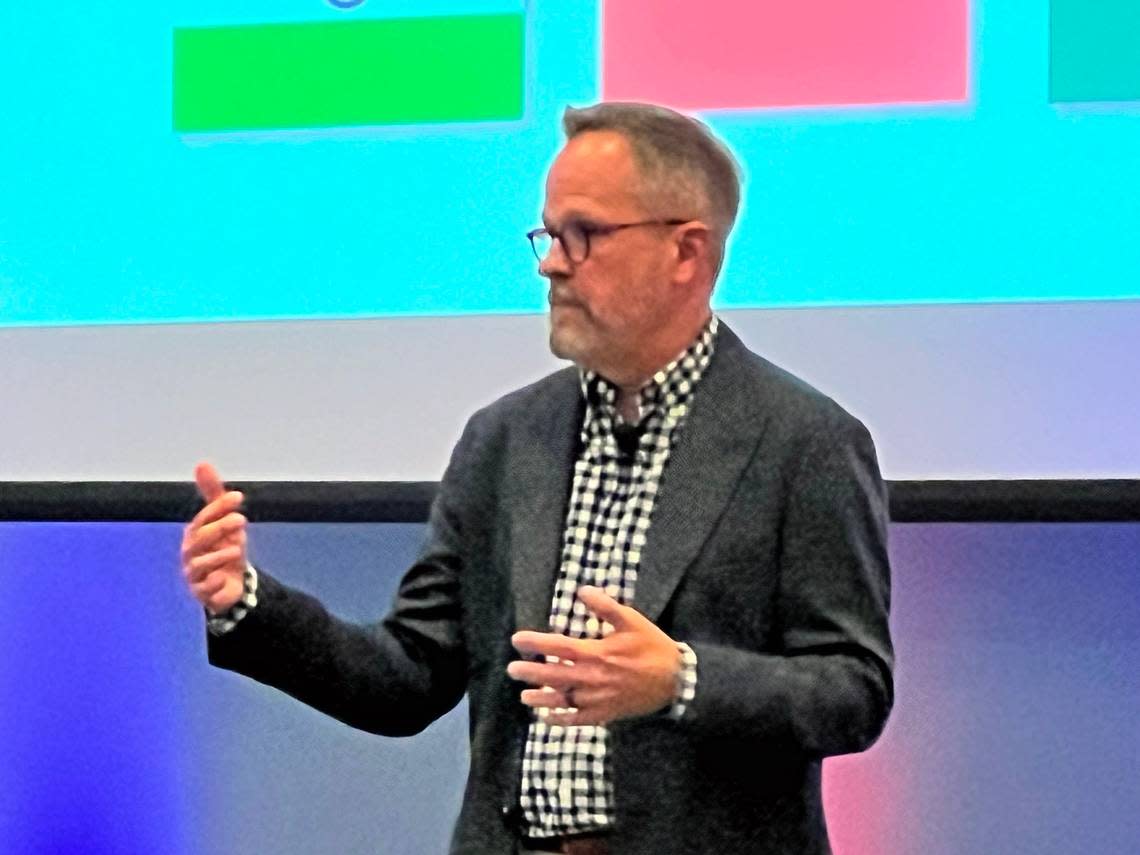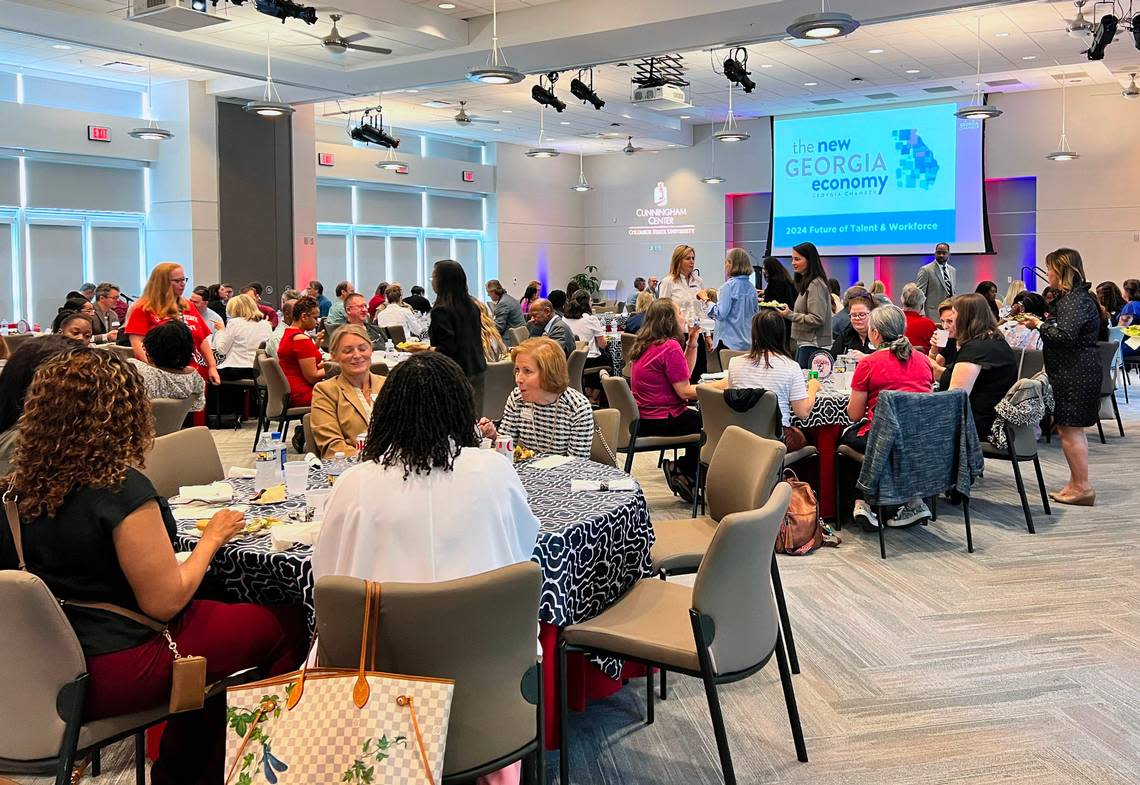AI and retiring Baby Boomers. GA Chamber CEO offers Columbus a glimpse of future workforce
Baby boomers are retiring, smaller generations are seeking to replace them in the workforce and rapidly-changing technology is affecting jobs. So how does that affect Georgia’s labor market?
Georgia Chamber President and CEO Chris Clark spoke Tuesday to Columbus State University employees to emphasize what he felt were the most important aspects of the changing workforce, which included awareness of diversity and the need to build tech skills.
CSU President Stuart Rayfield invited Clark to speak in conjunction with the launch of the university’s five-year strategic plan. Clark’s presentation focused on economic competitiveness and community impact, two major areas of the plan.
Clark’s presentation comes after the state Department of Economic Development’s Global Commerce team reported Georgia received more than $20.3 billion in investment during the last fiscal year, with rural areas of the state accounting for 83% of expansions and new locations.
The average wage growth in Georgia is outpacing inflation, Clark said during the presentation, but there is a caveat to the optimistic data points.
“Inflation is still putting difficult pressure on the most at-risk members of our society,” he said.
This is particularly true for individuals working low-skill jobs, Clark said.
However, more people are looking for work today in Georgia than in the last four years, he said. About 83% of eligible workers in Georgia are looking for work, Clark stated, but it’s important to note that the number includes people who are already employed.
“As I tell employers, you might think your employees love you and they love being here,” he said. “But when you walk down the hall, they’re on Indeed going to see if somebody loved them more.”

Here are five key takeaways from Clark’s presentation to the CSU employees.
Skills difficult to find in candidates
The highest unemployment rate demographically in Georgia is recent college graduates, at about 5.4%, Clark said.
“Namely because (recent college grads) realize they don’t have all the skills they need to be competitive,” he said.
About 50% of employers have told researchers the same thing, Clark said.
The three skills found lacking in current job candidates include:
Technical skills
Critical Thinking and problem solving
Communication skills
Everyone in the workforce is always going to have to upscale their technical skills by staying up to date with technology such as AI, for example, he said. In the past, people needed to refresh every few years. But as technology advances, they need to update about every six to eight months now.
But the education shouldn’t end there.
“Those technical skills will only get you so far if you can’t communicate your value, solve problems and be part of a team,” Clark said.

Changing demographics in the next five years
The way the workforce looks is changing dramatically, Clark said.
About five years ago, the average worker was a middle-aged white man, he said.
“But that time has passed,” Clark said. “This new workforce looks much different.”
Millennials will make up about 41% of Georgia’s workforce this year and Gen Z will account for about 31% of the workforce by next year.
“So, 71% of the workforce will be millennials and Gen Z combined,” Clark said. “Those are the most diverse generations in history.”
Women account for most of the workforce in Georgia today at 58%. The Black population makes up about 31% of Georgia’s workforce, and Hispanic people account for 20%. Around 12.5% of the workforce is made up of immigrants.
Colleges need to have programs in place to attract Hispanic students, Clark said. Otherwise, they will miss out on Georgia’s fastest-growing demographic.
And employers should reconsider how they do recruitment.
“You can’t keep sending dudes that look like me to recruit (employees),” Clark said. “(Candidates) need to be able to see … somebody that looks like me, thinks like me and this is what they’ve been able to do.”
Insufficient pipeline to replace Baby Boomers
A consequence of the Great Recession in 2008 was that the birth rate dropped significantly.
“The birth rate in America is now lower than it’s been since 1976,” Clark said.
A lower birth rate means fewer people coming into the workforce as Baby Boomers retire, he said. And as the generation retires, demand for health care and transportation will increase with less tax money from small, younger generations to pay for it.
Along with a smaller population, younger generations are not learning the same skills or entering the same industries as the Baby Boomers.
“We do not have a pipeline to fill the skill talents that the Baby Boomers have had over the last 40 years of their careers,” Clark said.
Some of the jobs include doctors, nurses, educators and skilled craftsmen, he said.
Clark encourages the business community to find ways to keep Baby Boomers engaged in the workforce longer with part-time work, job shares and changing the pension rules so people aren’t penalized for going back to work.
But ultimately, there needs to be more done to get kids interested in doing the needed jobs, he said.
Technology displacing jobs in near future
Artificial intelligence should displace about 12 million American jobs by 2030, Clark said.
“This calls for the largest upskilling of talent in our nation’s history in the shortest period of time,” he said.
The people most affected by the displacement will be low-skilled, under-educated individuals, Clark said. It will be important to encourage individuals to get at least some college education or a four-year degree.
“The group that we’re most worried about with this statistic are 30 to 45-year-old white males,” Clark said. “The ones that are leaving the workforce at the highest rate because they’ve not upskilled to be prepared for the future.”
Career opportunities in the future will be in energy, technology, logistics, cybersecurity, data and health care. This is along with skilled trades like flooring, electricians and mechanics.
There will also continue to be a demand for educators.
“We’ve got to restore, as a community, the value of teaching,” Clark said. “It is a noble profession worth treating with respect.”
While Clark is concerned about a future teacher shortage, he’s more concerned about about the shortage of health care professionals.
By 2030, Clark estimated there will be about 101,000 health care job openings in Georgia.

Expanding outreach and encouraging college
No matter what industry young people go into, they’re going to need a post-secondary credential or degree, Clark said.
There’s a cultural trend in younger generations telling them there’s no value in continuing education after high school, he said.
But data shows only 4% of people in Georgia with a bachelor’s degree live in poverty.
“If you at least have an associate’s degree or a technical college credential, it’s a little tougher, but there’s only 3.5% unemployment and 10% poverty rate,” Clark said. “It’s still really good. That number is going to get better.”
Another solution to fill vacancies is to expand outreach, he said.
Employers should consider hiring more veterans, disabled individuals, refugees, former foster kids, people with a criminal history, seniors and those recovering from addiction or struglling with mental health, he said.
“One of the solutions is bringing (people out of the workforce because of mental health) back on the campus, getting the skills they need to get back out into the workforce,” Clark said.
More details about the state’s economic landscape can be found in the Georgia Chamber’s Economic Competitiveness Redbook.






